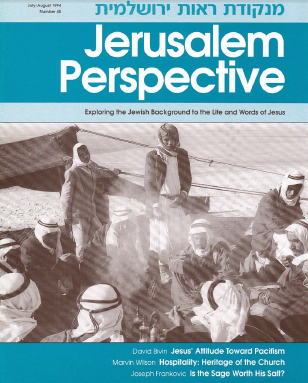In a rabbinic text written in the land of Israel about a century after the founding of the Byzantine Empire a story is told about Rabbi Yannai.[1] The story begins in this manner:
Once while Rabbi Yannai was walking on a road he met a man who was finely dressed. He said to him, “Rabbi, would you consider an invitation to our home?”
The man replied, “Whatever pleases you.”
Rabbi Yannai escorted the man into his home. He examined his knowledge of Bible, but found him wanting. He examined his knowledge of Mishnah, but found him wanting. He examined his knowledge of Talmud, but found him wanting. He examined his knowledge of Aggadah, but found him wanting….[2]
Having failed Yannai’s expectations four times, the poor guest demonstrates his absolute ignorance of the teaching of the sages when he declines an invitation to recite the standard blessing for the meal. The reason is clear: he does not know it.[3]
Instead of leading the blessing, the guest agrees to recite after Yannai, who says, “A dog has eaten Yannai’s bread.” But like many rabbinic stories, the plot has a startling twist, and in the end it is Yannai who is found wanting.
To an American or European, Yannai’s behavior would be offensive, but to an ancient Jew living in Israel during the third or fourth century, it would have been tolerable. Why? Yannai erroneously assumed his guest to be a learned student of the sages.[4] The chance meeting that took place on the road is, therefore, one that involved two individuals devoted to a life of Torah, at least this is what Yannai thought.
In antiquity when two sages crossed paths, it was not unusual for the hometown sage to ask the other a difficult question regarding the Torah, even before any sort of greetings were exchanged.[5] Apparently, this practice established a sort of rabbinic pecking order. Non-local or up-and-coming sages were questioned in public in order to ascertain their level of expertise. Those who answered wisely earned for themselves a respected reputation. Those who did not, well…there were always other career options.
This aspect of rabbinic culture was probably in its inceptive stages in the time of Jesus. Passages such as Luke 10:25-37 and Mark 10:2-9, where Jesus is asked publicly an “offensive” question, should be read with the above background information in mind. These passages, rightly understood, can provide an important corrective for certain misconceptions that Christian preaching and teaching have sometimes fostered.[6]
When a lawyer or a Pharisee directs a question toward Jesus, one need not assume that his motives are wicked. Jesus is indeed being tested, but within the expected cultural parameters of his day and age. In some cases, the lawyer or Pharisee may be sincerely offering a difficult question about Torah to Jesus, the young Galilean sage with a budding reputation, and in others, just checking to see if the new sage in town is really worth his salt.


Paid Content
Premium Members and Friends of JP must be logged in to access this content: Login
If you do not have a paid subscription, please consider registering as a Premium Member starting at $10/month (paid monthly) or only $5/month (paid annually): Register
One Time Purchase Rather Than Membership
Rather than purchasing a membership subscription, you may purchase access to this single page for $1.99 USD. To purchase access we strongly encourage users to first register for a free account with JP (Register), which will make the process of accessing your purchase much simpler. Once you have registered you may login and purchase access to this page at this link:
- [1] Yannai was a Galilean sage who flourished at the very beginning of the third century A.D. It is possible that this story reflects conditions from the same period in which Yannai lived. ↩
- [2] Leviticus Rabbah 9:3 (ed. Margulies, pp. 176-177). The English translation has been done by the author. ↩
- [3] Margulies comments: שאפילו ברכת מזון לא ידע (“that even the “Grace after Meals” he didn’t know”; line 11, p. 177). ↩
- [4] Margulies comments: וטעה בו רבי ינאי וחשב שהוא תלמיד חכם (“Rabbi Yannai mistakenly thought that he was a learned student of the sages”; line 1, p. 177) ↩
- [5] Compare Babylonian Talmud, Shabbat 108a and Bava Batra 22a. In Shabbat 108a the story is told of Rav’s arrival in Nehardea. Karna was sent by Shmuel in order to test Rav’s expertise. Rav, Shmuel, and Karna flourished in Babylonia at the beginning of the third century A.D. In Bava Batra 22a a similar story is told about Rav Dimi of Nehardea. He was denied the privilege of selling his dried figs in the market of Mahoza when he failed to answer Rav Adda bar Abba’s question about the case of a basket that is eaten and then excreted by an elephant. Adda bar Abba was sent by Rava to examine Rav Dimi of Nehardea. (These two sources were brought to the author’s attention by Professor Richard Kalmin of The Jewish Theological Seminary.) Rava, Adda and Dimi lived during the fourth century A.D. in Babylonia. See the entry “Dimi of Nehardea” in Encyclopaedia Judaica 6:49. Note the Aramaic idiom, פוק (זיל) תְּהֵי ליה בקַנְקַנֵּיה (go and smell his jar), which appears in both stories. It means “to examine a person’s mental capacity.” See Marcus Jastrow’s A Dictionary of the Targumim, the Talmud Babli and Yerushalmi, and the Midrashic Literature, p. 1395. ↩
- [6] This article touches upon the larger issue of the relationship of Jesus to the leaders of the Jewish people, namely the Pharisees. Traditionally, the Pharisees have been viewed as enemies of Jesus, who seek to kill him. Two important works for rethinking Christianity’s attitude toward the Pharisees are David Flusser’s Foreword to Robert L. Lindsey’s A Hebrew Translation of the Gospel of Mark, pp. 4-5; and Adolph Büchler’s discussion of Honi and his prayer for rain in Types of Jewish-Palestinian Piety from 70 B.C.E. to 70 C.E., especially p. 254. ↩































































































